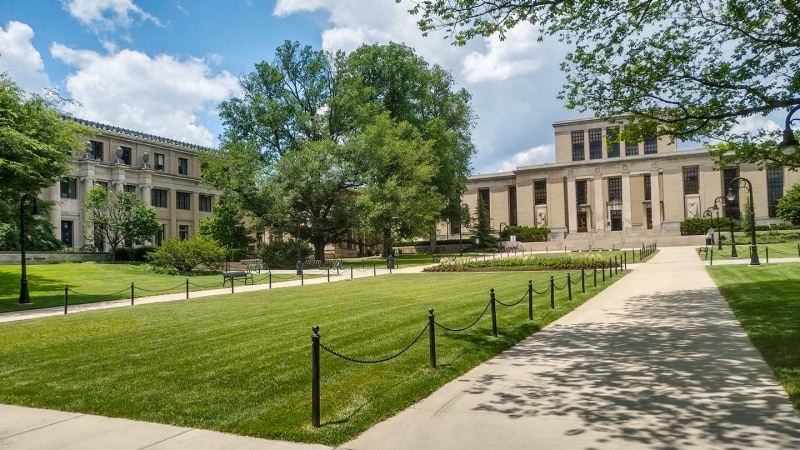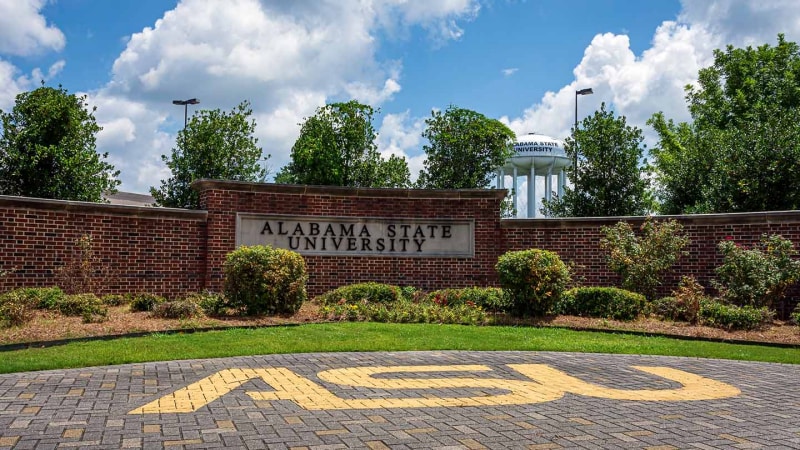A first-generation college student’s guide to navigating the application process

Senior Associate, JPMorgan Chase

If you’re the first person in your immediate family who’ll be attending college, you may be on your way to becoming a first-generation college student. While this may feel intimidating, know that you aren’t alone. According to recent data by the Center for First-Generation Student Success, about one in four college studentsOpens overlay have parents who didn’t attend any form of schooling after high school.
Being the first person in your family to attend college is an outstanding achievement. Not only will you be furthering your education, but you’ll also set yourself up for future career success. While you don’t need a college degree to land a job, some estimates show that having a bachelor’s degree may help you earn 84% more than having only a high school diplomaOpens overlay. A college degree may also serve as a buffer during an economic downturn.
Understanding the benefits of college is one thing, but navigating applying and enrolling in college as a first-generation college student is another. How do you get started on your college application journey and ensure your transition is a successful one?
Keep reading as we break down the college application process for first-generation college students and provide resources that may help you on your journey.
What’s a first-generation college student?
First things first, what’s a first-generation college student? According to the federal government, a first-generation college student is someone whose parents did not complete a bachelor's degree or some kind of higher education. In a scenario in which you only lived with one parent your whole life who cared financially for you (and this could be for many reasons), and this parent didn’t complete a bachelor’s degree, and you end up attending college, you too count as a first-generation college student under this definition. This definition is important to understand because the federal government uses it to determine eligibility for financial aid programs like the TRIO programs, for instance.
The definition of what a first-generation college student is may vary among colleges and universities, though. For instance, the University of Pennsylvania definition includes students whose parents received a degree outside of the U.S.
Given that institutions define first-generation student differently and offer benefits and resources to first-generation students specifically, you may want to check with college and university admissions offices during the application process to see if you qualify as a first-generation student, according to their unique standards.
How to apply to college as a first-generation student
The college application process may feel daunting, especially if you don’t have parents or immediate family who’ve attended college to guide you. During the process, you’ll have to research colleges, study for standardized exams, fill out school applications, potentially apply for financial aid, and decide where to attend. Fortunately, many resources are at your disposal to make these responsibilities easier.
Checklist for first-generation college students applying to college
Here’s a list that may help you prepare for college applications.
1. Start preparing early (like in your sophomore year of high school)
- Research potential colleges and universities to understand their offerings, campus culture, and admissions requirements.
- Identify the type of college experience you want (size, location, majors, extracurriculars).
2. Understand the academic requirements you need to meet
- Understand your target schools’ grade point average (GPA) and standardized test score requirements.
- Consider meeting with your high school academic advisor and college counselor often to ensure you’re enrolled in the right classes and overall tracking toward your goal of attending college.
3. Prepare for standardized tests
- Register for the SAT or ACT exams and check if your desired schools require or recommend taking them.
- Prepare for these exams using online resources, books, or classes.
4. Research and apply for financial aid and scholarships
- Fill out the Free Application for Federal Student Aid (FAFSA®) to determine if you're eligible for federal financial aid along with other types of financial aid.
- Consider researching and applying for scholarships. Consider looking for those that specifically support first-generation students (see below for tips for this).
5. If you’re able to, plan college visits
- Schedule campus visits if it’s feasible for you to get a feel for the environment and ask questions.
- Attend college fairs in your area and meet with college admissions representatives.
6. Tee up your letters of recommendation
- Identify teachers, counselors, or mentors who can write strong, personal recommendations.
- Request these letters well in advance of deadlines.
7. Prepare your personal statement and essays
- Start brainstorming and drafting your college essays early (see below for tips for this).
- Have teachers, counselors, and others review your essays for feedback.
8. Complete your college applications
- Familiarize yourself with the Common App (which you can use to apply to over 1,000 U.S. colleges) and individual college applications.
- Complete all sections of applications carefully and accurately.
9. Keep track of deadlines to make sure you meet them
- There are many deadlines to keep track of during the college process, including college application deadlines, financial aid deadlines, and scholarships deadlines.
- Consider Early Decision or Early Action applications in which you’d apply to colleges earlier in the process.
10. Utilize all the resources that you can
- Connect with organizations and programs that support first-generation college students.
- Look for mentorship programs at potential colleges and within your community to help with the college process.
11. Undergo interview preparation
- If interviews are required, prepare by practicing with teachers, counselors, or mentors.
- Research common interview questions and think about your responses.
12. Do a final review and submit your applications
- Review all materials for completeness and accuracy.
- Submit applications and confirm receipt with each college.
13. Start preparing to enroll in college
- Prepare for potential waitlist or deferral outcomes that may come from your college applications.
- Accept an offer and complete any necessary steps for enrollment.
First-generation college student essay tips
As covered briefly above, you’ll likely need to write one or several personal essays during the college application process. As a first-generation college student, your college essay is a unique opportunity to showcase your perspectives, experiences, and the obstacles you’ve overcome on your road to college.
You may want to begin by reflecting on your journey — what being the first in your family to attend college means to you, the challenges you’ve faced, and how these experiences have shaped your ambitions and character. By crafting a compelling essay, you may help admissions officers understand your background and the resilience you bring to your educational pursuits.
As you write your essay, you may want to focus on specifics rather than generalities to bring your story to life. Instead of simply stating that you’ve faced challenges, describe a moment that illustrates how you’ve been challenged and how you responded. Remember, the goal is to let college admissions committees see the world through your eyes and appreciate the context of your achievements.
After you have a draft of your essay or essays ready, don’t hesitate to seek feedback from teachers, mentors, and counselors who understand the college application process. They may be able to provide valuable insights into how college admissions officers might perceive your essays.
First-generation college student scholarship tips
As briefly covered above, alongside the college application process, if you’re looking for financial aid to support your college journey, you may consider looking into scholarships specifically for first-generation college students. Some organizations and nonprofits are specifically seeking to help students like you.
Here are a few scholarships you may consider as a first-generation college student:
- The Thurgood Marshall College Fund and The Sallie Mae Fund Completing The Dream Gap ScholarshipOpens overlay
- Esperanza Scholarship Foundation Dollars for Scholars ScholarshipOpens overlay
- The National Society of High School Scholars First Generation ScholarshipOpens overlay
- EducationDynamics Minority First Generation Scholarship ContestOpens overlay
Programs that support first-generation college students
If the steps involved in applying for college seem overwhelming, the good news is that many programs aim to support first-generation college students on their educational journey. Here are a few.
College Track Scholar ProgramOpens overlay
College Track is a nonprofit organization dedicated to helping students with limited resources achieve their dream of attending college. The organization works with students from the time they’re in ninth grade through college to help them on their journey to receiving a bachelor’s degree.
At the high school level, they help students through academic learning labs, college counseling, and even individualized coaching. When students reach college, the organization helps with career readiness, community building, and financial wellness activities. Finally, they provide early career support in the first two years after a student’s college graduation.
Let’s Get Ready prioritizes admittance for students who meet specific criteria, such as first-generation college students or students from historically underrepresented communities. It provides students with free college application support with help from peer-led coaches and virtual SAT exam prep courses, and other tools. For those who’d like to seek help from someone who’s been in their shoes, Let’s Get Ready pairs program participants with current college students who act as mentors.
America Needs YouOpens overlay
For first-generation students already enrolled in college, America Needs You is a nonprofit organization with a Fellows Program that supports low-income, first-generation college students with resources to help them successfully graduate college, succeed in their careers, and remain competitive in today’s workforce. The Fellows Program helps with internship placements, provides up to $1,000 in grant funding annually, and offers one-on-one mentorship to all enrollees.
Navigating the summer before college starts as a first-generation college student
After you commit to college, you may want to see if any summer orientation programs or bridge programs at your chosen college specifically for first-generation students are available to you before you start school.
Some colleges offer orientation programs that bring together faculty, students, and in some cases, family members to help ensure first-generation students have an easy transition into college life.
If the college you’re enrolling in offers one of these programs, consider taking part. They typically last from between two to four weeks during the summer months. During these programs, you can also ask questions related to everything from picking out classes to navigating dorm life if you plan to live on-campus. You can also start to make college friends.
Final thoughts
If you’re a first-generation student embarking on your college journey, know that it may feel confusing at first, though many resources are available to help. Above all else, as you undergo this journey, you should feel proud that you’re the first in your family to start this path toward higher education. You may inspire many others in your professional and personal circles for years to come.



